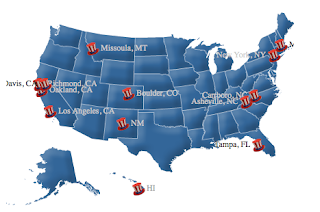David Rothkopf spoke yesterday at Seattle Town Hall on the rise of private power on a cold rainy night.
Rothkopf served as deputy under secretary of commerce for international trade policy in the Clinton Administration. Rothkopf was managing director of Kissinger Associates, an international consulting firm, founded and run by Henry Kissinger and Brent Scowcroft and went on to start two international advisory firms of his own. He is now a visiting scholar at the Carnegie Endowment as well as CEO and editor at large of Foreign Policy magazine.
Rothkopf is the author of three books, most recently, Power, Inc.: The Epic Rivalry Between Big Business and Government and the Reckoning that Lies Ahead.
Power, Inc.
Rothkopf begins with the origins of corporations in the Europe of the middle ages where church and state competed for power. Since that time, the world has moved to an era in which the axis of political tension is beween corporations and the state.
Governments midwived the birth of corporations, creating early state sponsored companies like the Dutch and British East India companies, an event soon followed by the South Sea Island Bubble. Church, state and the corporation are different approaches for controlling and allocating wealth, status and authority in society. In western countries, the church was largely tamed. But, in the modern day, laissez-faire capitalism has enabled the corporation to become a serious rival of state power.
There are several means of deploying power available to nations - control of borders, printing money, passing laws, military force. Multinational companies can circumvent many of these by changing domicile to the most favorable legal environment. Most financial instruments are created by private entities. Some big corporations have larger cash flow than most countries.
The financial crisis was a shocking demonstration of corporate power. When the shit hit the fan, who did we help? Homeowners? Nope, Wall Street. Next came the Citizens United decision, a milestone in the increasing political rights of corporations.
Thomas Jefferson, William Brandis and Adam Smith all mistrusted corporations and feared their influence on politics. Alexander Hamilton was their early cheerleader in American history and architect of the framework in which corporations helped America rise to power.

Adolf Fassbender, The White Night, 1932
American Capitalism
The financial crisis left the reputation of Anglo-American Capitalism in taters and the disfunction of American politics isn't helping America's influence in the world. Rothkopf took a big swipe at the premature triumphalism of the 1990's exemplified by Francis Fukuyama's The End of History which asserted that the Washington Consensus represented "the end point of mankind's ideological evolution and the universalization of Western liberal democracy as the final form of human government."
Ideologicalization of American politics has rendered constructive debate impossible. (Ideology sucks! See the tag-line above.) The great opportunity presented by the crisis for financial reform was wasted. The watered down reform that was enacted remains underfunded and mostly unimplemented.
As traditional forms of state power are increasingly ineffective, the US government has put all it's chips on military power, developing its comparative advantage at projecting force. This is the "leviathan" doctrine articulated in Thomas Barnett's 2004 book The Pentagon's New Map, which set out a grand strategy for an American foreign policy specializing in policing the globalized world economy.
Different capitalisms
What is taking the place of the Washington Consensus, both between and within countries, is a competition among several different varieties of capitalism: state capitalism, entrepreneurial capitalism, small business capitalism, chaotic capitalism.
Can corporations be made to serve societies? Rothkopf believes so. But, we need to intelligently discus the alternatives, and be willing to cede authority upward to transnational bodies. Viewed in this light, the EU as an experimental attempt to regain lost sovereignty. Rothkopf also cited public/private partnerships such as those that created the transport system in the US and the internet.
The Scandinavian countries, Rothkopf pointed out, are near the top of the rankings, including quality of life, education, and per-capita GDP. It's amusing to note that socialist Sweden let Saab go under at the same time the nominally capitalist US was bailing out GM. The reason? A generous safety net in Sweden made bankruptcy possible.
Rothkopf, perhaps understandably considering his background in publishing, sees a comparative advantage in protection of intellectual property. I see problems with that. At least in its current form, IP law overwhelmingly favors big companies, holding back innovation. Patents and copyrights are a blatant example of corporate manipulation of the legal environment. Erecting barriers to the creative remixing of ideas will merely succeed only in exporting the vibrant technology sector and with it another of the crown jewels of the American economy.
Rothkopf's intelligence and scholarship were evident throughout his thought-provoking talk. The same could not be said of the questioners in the Q&A session. The city that brought the world the Battle of Seattle couldn't muster many rhetorical molotov cocktails. Step it up, Seattle.
More






